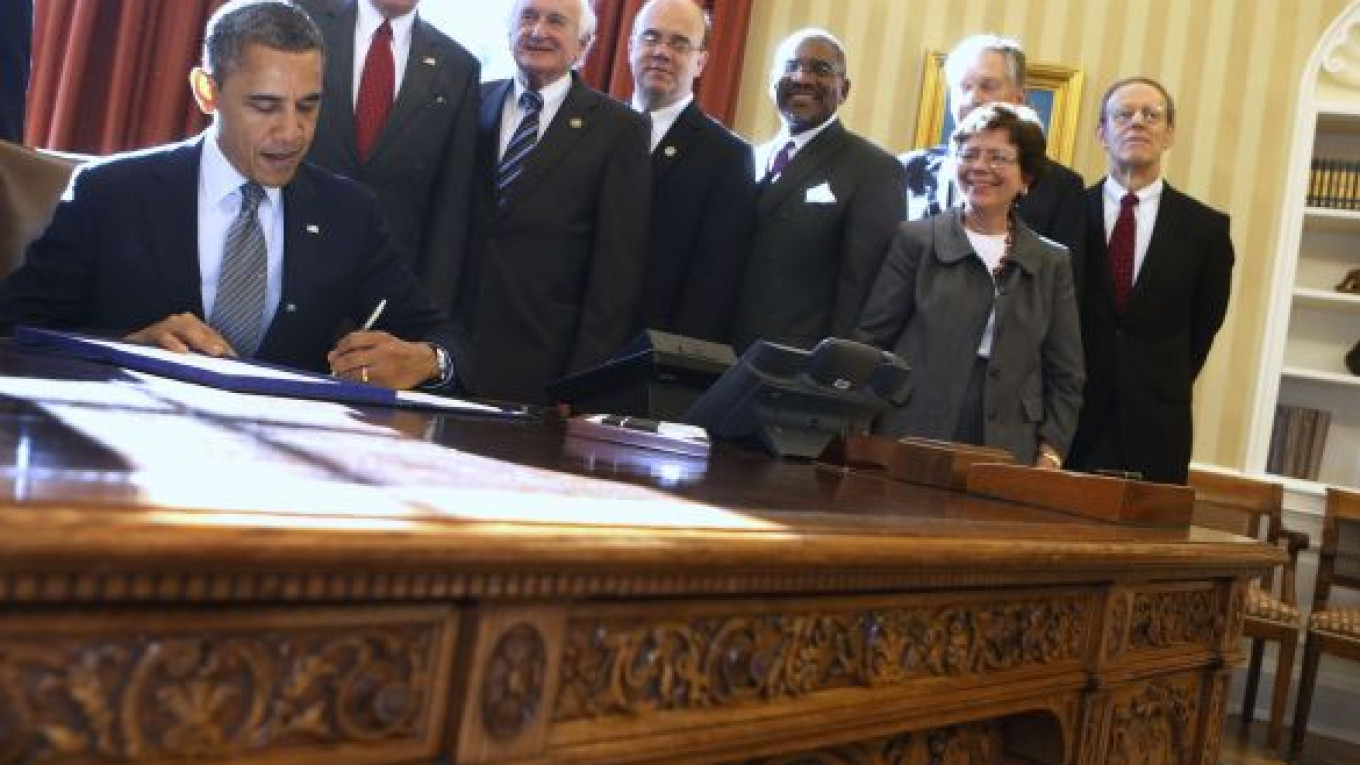WASHINGTON — U.S. President Barack Obama on Friday signed a bill that brings American trade relations with Russia into the 21st century but also ushers in a testy era in which the United States could publicly "name and shame" Russian human rights violators.
The measure, which Congress passed by an overwhelming margin, allows Obama to establish "permanent normal trade relations," or PNTR, with Russia by lifting a Cold War-era restriction on trade.
It also directs Obama to bar Russian human rights violators from entering the United States and freeze any assets they have in U.S. banks. The provision is named in honor of Sergei Magnitsky, a Russian anti-corruption lawyer many U.S. lawmakers believe was beaten to death in a Russian jail in 2009.
President Vladimir Putin on Thursday called the congressional approval of the bill "a purely political and unfriendly act." He added, "I don't get why they would sacrifice U.S.-Russian relations in order to get some political dividends at home."
Moscow kept up the fiery rhetoric on Friday in a Foreign Ministry statement after Obama's signing. It called the law "shortsighted and dangerous" and an "overt interference into our internal affairs."
The statement put most of the blame for the Magnitsky measure on U.S. lawmakers, but said it regretted Obama could not "overcome those … who see our country not as a partner but as an enemy."
U.S.-Russian relations have already been strained over the conflict in Syria and the treatment of critics of the Kremlin since Putin returned to the presidency in May.
Russia last week banned imports of U.S. pork and beef containing ractopamine, a widely used feed additive the United Nation's food agency in July said "had no impact on human health" if residues stay within recommended levels.
"Being a WTO member means Russia's import standards have to be based on sound science, but their plan to block U.S. beef and pork is anything but sound," Senate Finance Committee Chairman Max Baucus said, referring to the World Trade Organization, which Russia joined in August. He urged Moscow to reverse the move.
The Magnitsky law directs Obama to publish the names of Russians deemed to be human rights violators, but allows him to keep some names classified if he decides that it is in the interest of U.S. national security. Congress is due to receive the first list in 120 days, and Obama must explain in advance any names he decides to keep secret.
Russia considers the Magnitsky provision an insult. On Friday the lower chamber of its parliament gave preliminary approval to a measure barring Americans who violate the rights of Russians from entering the country.
It targets Americans involved in "unfounded or unjust" sentences against Russians — a nod to Viktor Bout, a Russian arms trader serving a 25-year prison term in the United States after what Moscow says was a politically motivated prosecution and an unfair trial.
The Russian bill, expected to be signed by Putin before the end of the year, also targets Americans accused of abusing Russian-born adopted children and U.S. judges or authorities deemed to have been too lenient in such cases.
Pro-Kremlin lawmakers have proposed the bill be named after Dmitry Yakovlev, a Russian-born boy who died at the age of 18 months after his adoptive U.S. family left him locked in a vehicle in Virginia in 2008.
Business groups pushed Congress for months to approve PNTR, which was needed to ensure that U.S. firms get all the market-opening benefits of Russia's entry into the WTO.
Without it, U.S. companies such as Caterpillar, Ford, JPMorgan Chase and others feared they would be at a disadvantage to competitors in other countries that already have full WTO relations with Russia.
It was also needed to allow the United States to use the WTO dispute-settlement system to challenge any Russian actions it says unfairly restrict U.S. imports, although the two sides still need to formally establish full WTO relations in Geneva first.
Related articles:
A Message from The Moscow Times:
Dear readers,
We are facing unprecedented challenges. Russia's Prosecutor General's Office has designated The Moscow Times as an "undesirable" organization, criminalizing our work and putting our staff at risk of prosecution. This follows our earlier unjust labeling as a "foreign agent."
These actions are direct attempts to silence independent journalism in Russia. The authorities claim our work "discredits the decisions of the Russian leadership." We see things differently: we strive to provide accurate, unbiased reporting on Russia.
We, the journalists of The Moscow Times, refuse to be silenced. But to continue our work, we need your help.
Your support, no matter how small, makes a world of difference. If you can, please support us monthly starting from just $2. It's quick to set up, and every contribution makes a significant impact.
By supporting The Moscow Times, you're defending open, independent journalism in the face of repression. Thank you for standing with us.
Remind me later.






